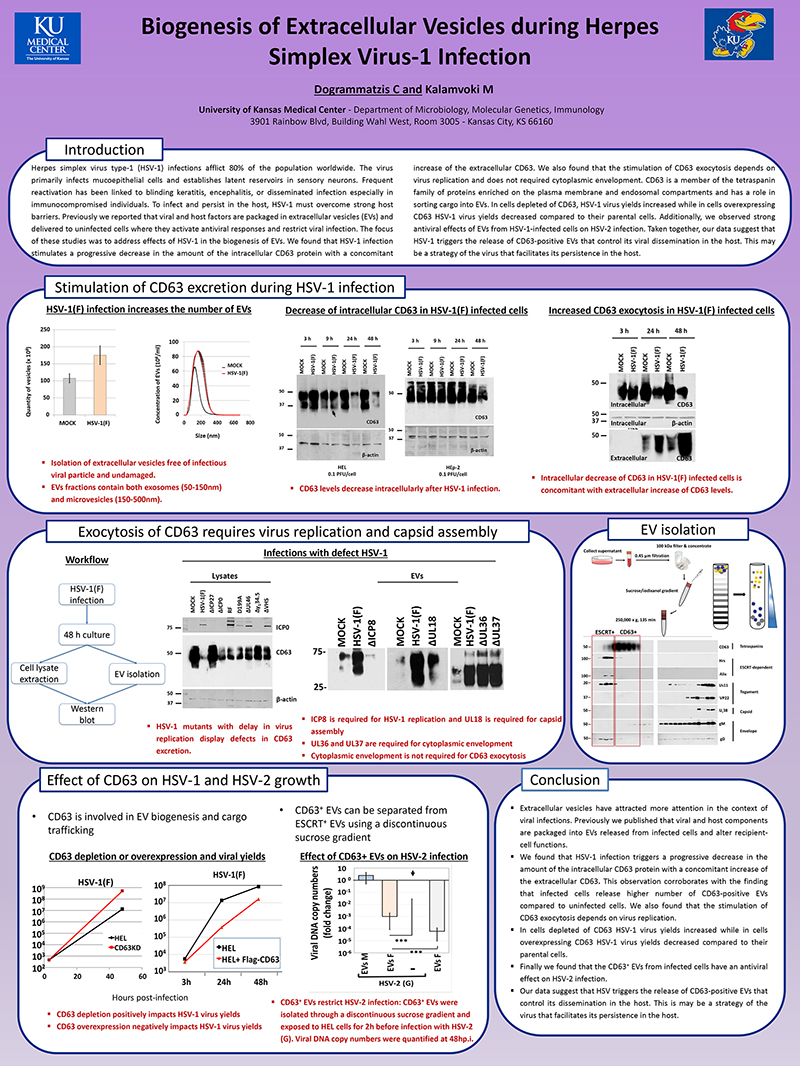
Hover to pan and click to magnify. Click again to pan at full screen.
Dogrammatzis C, Kalamvoki M, Ph.D
Dogrammatzis C, Kalamvoki M, Ph.D
University of Kansas Medical Center - Department of Microbiology, Molecular Genetics, Immunology
Introduction
Herpes simplex virus type-1 (HSV-1) infections afflict 80% of the population worldwide. The virus primarily infects mucoepithelial cells and establishes latent reservoirs in sensory neurons. Frequent reactivation has been linked to blinding keratitis, encephalitis, or disseminated infection especially in immunocompromised individuals. To infect and persist in the host, HSV-1 must overcome strong host barriers. Previously we reported that viral and host factors are packaged in extracellular vesicles (EVs) and delivered to uninfected cells where they activate antiviral responses and restrict viral infection. The focus of these studies was to address effects of HSV-1 in the biogenesis of EVs. We found that HSV-1 infection stimulates a progressive decrease in the amount of the intracellular CD63 protein with a concomitant increase of the extracellular CD63. We also found that the stimulation of CD63 exocytosis depends on virus replication and does not required cytoplasmic envelopment. CD63 is a member of the tetraspanin family of proteins enriched on the plasma membrane and endosomal compartments and has a role in sorting cargo into EVs. In cells depleted of CD63, HSV-1 virus yields increased while in cells overexpressing CD63 HSV-1 virus yields decreased compared to their parental cells. Additionally, we observed strong antiviral effects of EVs from HSV-1-infected cells on HSV-2 infection. Taken together, our data suggest that HSV-1 triggers the release of CD63-positive EVs that control its viral dissemination in the host. This may be a strategy of the virus that facilitates its persistence in the host.
Stimulation of CD63 excretion during HSV-1 infection
(View poster)
HSV-1(F) infection increases the number of EVs
Isolation of extracellular vesicles free of infectious viral particle and undamaged.
EVs fractions contain both exosomes (50-150nm) and microvesicles (150-500nm).
(View poster)
Decrease of intracellular CD63 in HSV-1(F) infected cells
CD63 levels decrease intracellularly after HSV-1 infection
(View poster)
Increased CD63 exocytosis in HSV-1(F) infected cells
Intracellular decrease of CD63 in HSV-1(F) infected cells is concomitant with extracellular increase of CD63 levels.
(View poster)
Exocytosis of CD63 requires virus replication and capsid assembly
HSV-1 mutants with delay in virus replication display defects in CD63 excretion.
-ICP8 is required for HSV-1 replication and UL18 is required for capsid assembly
-UL36 and UL37 are required for cytoplasmic envelopment
-Cytoplasmic envelopment is not required for CD63 exocytosis
(View poster)
EV isolation
(View poster)
Effect of CD63 on HSV-1 and HSV-2 growth
CD63 is involved in EV biogenesis and cargo trafficking
CD63 depletion or overexpression and viral yields
(View poster)
-CD63 depletion positively impacts HSV-1 virus yields
-CD63 overexpression negatively impacts HSV-1 virus yields
CD63+ EVs can be separated from ESCRT+ EVs using a discontinuous sucrose gradient
Effect of CD63+ EVs on HSV-2 infection
(View poster)
CD63+ EVs restrict HSV-2 infection: CD63+ EVs were isolated through a discontinuous sucrose gradient and exposed to HEL cells for 2h before infection with HSV-2 (G). Viral DNA copy numbers were quantified at 48hp.i.
Conclusion
- Extracellular vesicles have attracted more attention in the context of viral infections. Previously we published that viral and host components are packaged into EVs released from infected cells and alter recipient-cell functions.
- We found that HSV-1 infection triggers a progressive decrease in the amount of the intracellular CD63 protein with a concomitant increase of the extracellular CD63. This observation corroborates with the finding that infected cells release higher number of CD63-positive EVs compared to uninfected cells. We also found that the stimulation of CD63 exocytosis depends on virus replication.
-In cells depleted of CD63 HSV-1 virus yields increased while in cells overexpressing CD63 HSV-1 virus yields decreased compared to their parental cells.
-Finally we found that the CD63+ EVs from infected cells have an antiviral effect on HSV-2 infection.
-Our data suggest that HSV triggers the release of CD63-positive EVs that control its dissemination in the host. This is may be a strategy of the virus that facilitates its persistence in the host.

Present with Google Meet
Invite as many as 30 people, and present your poster in high definition. Transcription option is available. Free to use.
DISQUS COMMENTS WILL BE SHOWN ONLY WHEN YOUR SITE IS ONLINE